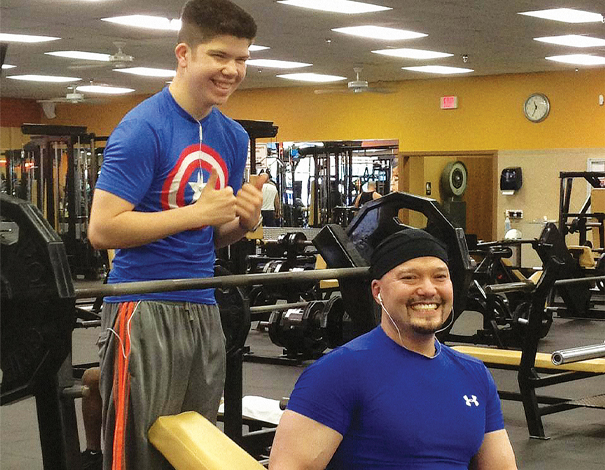As someone who liked to push himself to the limit during a workout, Chris knew how to overcome a challenge. However, nothing could prepare him for the challenge he would have to face not once, but twice.
Chris was in pain and thought he’d pinched a nerve or pulled a muscle. He went to the emergency room where he got news he never expected. Doctors told him he had anaplastic large T-cell lymphoma—an aggressive form of cancer with a high likelihood of relapse.
He had an autologous blood stem cell transplant first. But about a year and a half later, the cancer came back and it was time for an allogeneic blood stem cell transplant. While he faced many challenges along the way, Chris also gained a new appreciation for life. Here’s his story, in his own words.
I’d always lived a pretty healthy lifestyle, so when I got the cancer diagnosis it was quite a shock. I looked at my wife with tears in my eyes and said I was sorry. Thank God for my wife! She was my support that day and every day since.
After both of my transplants, I needed to stay about 2 hours away from home so I could be near my transplant hospital. It was tough being away from my wife and 2 young sons.
Going home felt good, but it was an adjustment. I couldn’t just jump right into my old routine. That was hard to accept at times. But my family understood and gave me time to ease back into being a husband and father. Finally being able to drive my kids to school again gave me some normalcy and helped me recover emotionally.
When you have to stay isolated from other people and can’t do the things you used to do, the days can start to merge together. I found that getting a routine going and giving order and purpose to my day helped. I used exercise both to give structure to my day and to vent the frustrations I was feeling.
I also kept a journal to record how I felt and what I did each day. It made the days easier to track and appreciate. I still write in it every day.
Once I could go out in public, I sometimes felt like an alien. I had to wear a mask to protect myself. I also developed graft-versus-host disease (GVHD) on my skin. I have darker skin and the GVHD left me with cheetah spots that I still have today. I felt awkward around other people at first. But then I told myself, ‘You’ve been through a lot. You fought a battle. You’re on the road to recovery and getting stronger.’ I knew that most of the physical and emotional changes I was experiencing were temporary, and I was thankful to be alive.
While it wasn’t easy, going through transplant has had a positive impact on my life, too. I’m more open to people and have a better appreciation for life. When people say, ‘It’s good to see you!’ I reply, ‘It’s good to be seen!’ I’m glad to still be here and I’m thankful for each day I’m given.
Your sense of progress
During early recovery, your main focus likely is on what is right in front of you, like getting to appointments, taking medicines, eating and resting. You may even have needed to go back into the hospital. You may feel discouraged. Positives and progress can sometimes be hard to see when you’re in the middle of early recovery. But remembering these can help you cope. Reflect on some of the positives that are happening for you. Ask:
- What is one thing I did today that I couldn’t do a month ago?
- What small things am I grateful for?
- What made me smile today? What brought me joy?

